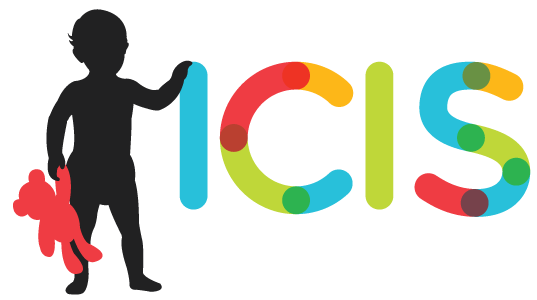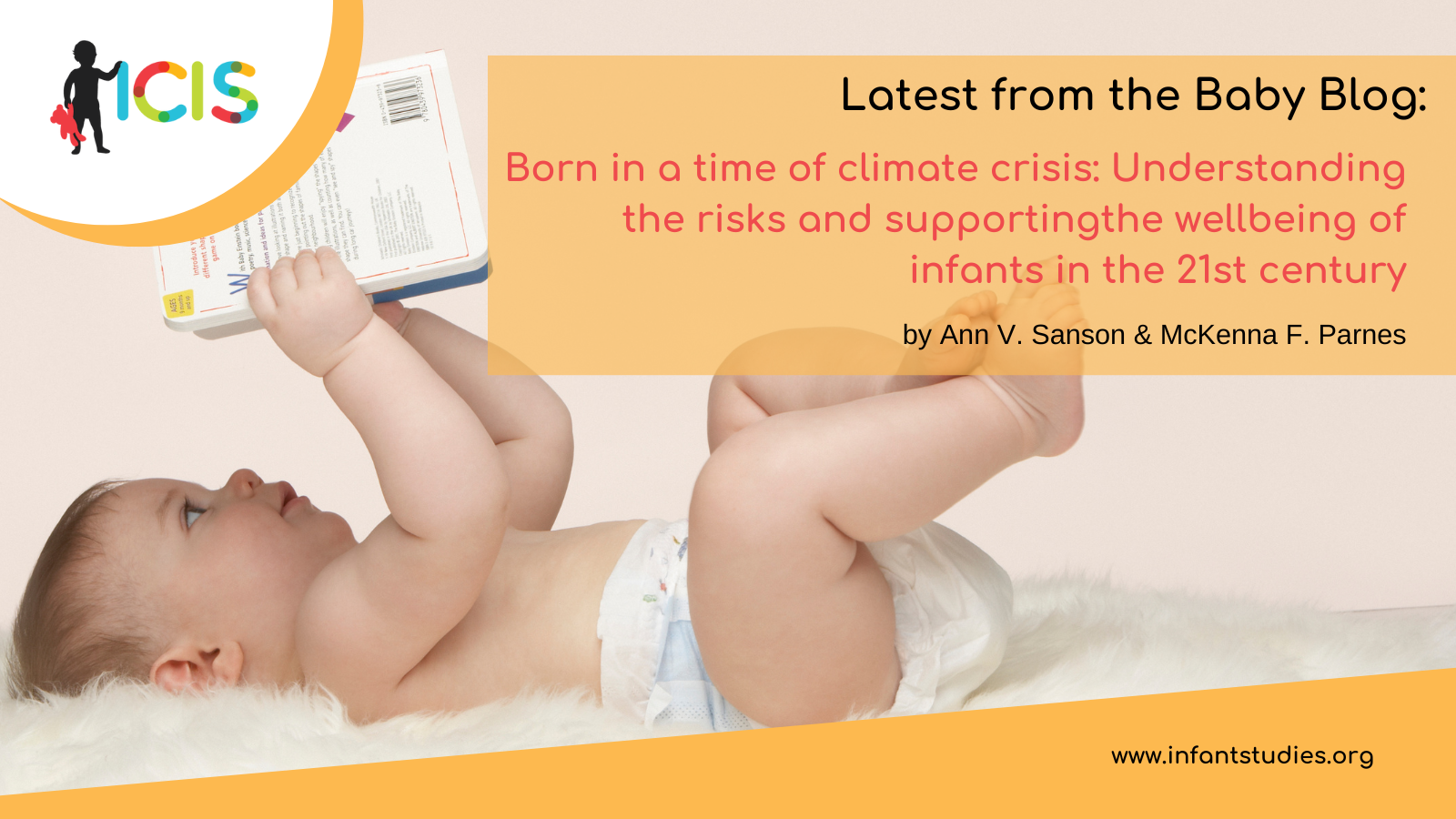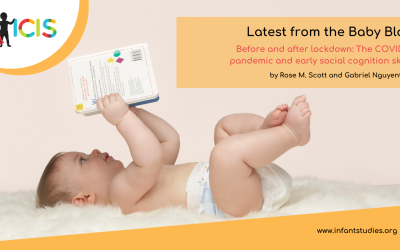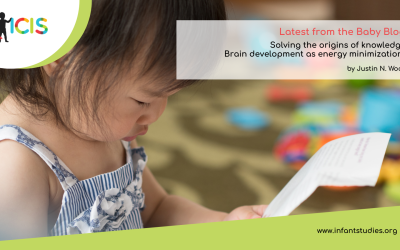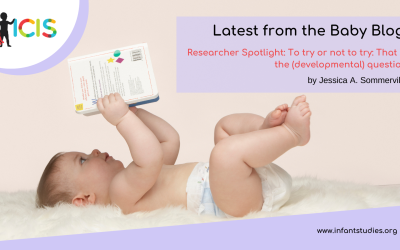However, the consequences of climate change for the lives of children and families are less often discussed, despite their great relevance to infancy researchers and practitioners. Here we summarize the climate risks to infants and try to identify some of the important considerations for us, before introducing Developmental Scientists for Climate Action, a new support network for scholars and practitioners concerned about the implications of climate change for human development.
Impacts of climate change on infants
First, it is important to recognize children’s greater vulnerability to climate change, which threatens children’s mental and physical health in many ways (Parnes et al., 2024; Sanson et al., 2022). Children under 5 disproportionately suffer injuries and fatalities during climate disasters, and bear close to 90% of the burden of diseases brought about through rising temperatures, changing rainfall patterns, food and water scarcity and other climate events (Ahdoot et al., 2024). Their greater vulnerability is due to both their physiological immaturity and their reliance on caregivers to protect them, so when caregivers themselves are stressed, injured, or unavailable, infants suffer (Anderko et al., 2020; Olson & Metz, 2020).
Infants’ vulnerability actually starts before birth: maternal exposure to extreme temperatures and air pollution is associated with higher rates of adverse birth outcomes, including infant mortality, preterm birth and low birth weight (Anderko et al., 2020). Associations exist between prenatal maternal stress due to climate-related disasters and deficits in child cognitive, motor, socioemotional, and behavioral functioning (Olson & Metz, 2020). These pre-birth risks are particularly severe in low-income countries and disadvantaged communities, which are more likely to be exposed to climate events including droughts, hurricanes, heat waves and air pollution, as well as greater barriers to accessing health care and other resources that affect their capacity to adapt (Ahdoot et al., 2024). For example, an extreme drought in Ethiopia in 2022 led to crop failures and dried-up boreholes, which posed particular risk to pregnant women who have higher needs for nutrient-rich foods. In Bangladesh, extreme typhoons and cyclones have resulted in salinisation of water, including drinking water, and the high salt content has led to more pregnant women experiencing high blood pressure and even pre-eclampsia (Kabir, 2024). Limited access to resources make these dire situations even worse, and unfortunately it is predicted that these events and related risks will continue to increase as climate change worsens.
Addressing the climate crisis and mitigating consequences for future generations requires a global collective effort. The Paris Agreement is an international treaty on climate change in which 196 countries agreed to take action to keep global warming below 2 degrees Celsius, and preferably below 1.5 degrees. Unfortunately, few countries are on track to meet their obligations. Worryingly, modeling shows that, even if Paris Agreement pledges are fulfilled, a child born in 2020 will experience two to more than ten times the number of climate disasters (such as floods, wildfires, crop failures, and droughts) over their lifetime than a person born in 1960 (Thiery et al, 2021). Moreover, both physical and psychological climate change stressors will accumulate over the lives of today’s children, increasing their allostatic load and placing them at risk of mental and physical health challenges later in life (Vergunst & Berry, 2022; Olson & Metz, 2020). This alarming prediction suggests that much more attention to climate change is needed from practitioners and researchers committed to understanding and working to protect the wellbeing of the next generation.
Responses to support infants and their families
In the face of the dire implications of climate change for infants and their families, how do, as experts in human development, we support them? The first and most critical role for those of us with responsibilities for future generations is to work hard to limit the severity of climate change—and that means encouraging policy-makers and decision makers to take speedy and far-ranging action to halt carbon emissions and reduce greenhouse gasses in the atmosphere. In addition, there are several more specific avenues for action for both practitioners and researchers.
Roles for practitioners
One role for practitioners is to be attentive to possible climate distress amongst those they are working with Climate change is often the ‘elephant in the room’—a huge but unacknowledged or avoided source of parental distress, fear, and other complex emotions as they contemplate their childrens’ future (e.g., Benoit et al., 2021). Whether parents’ worries and fears about climate change are operating at a conscious or subconscious level, helping parents manage their own stress and distress will help protect their capacity to parent effectively and avoid intergenerational transmission of stress.
Some parents might benefit from individual therapy. The Climate Psychiatry Alliance offers a climate-aware therapist directory of clinicians licensed in the United States, United Kingdom, and Canada, with over 300 providers available; while in Australia, Psychology for a Safe Climate (https://www.psychologyforasafeclimate.org/) offers support for managing climate distress.
For other parents, taking action on climate change by reducing emissions in their own households and more generally is a good way to build their sense of efficacy and hope. For example, O’Sullivan and Chisholm (2020) describe home-based solutions to maintain child health during extreme heat, such as upgrading home cooling and heating systems to more sustainable and energy efficient systems. This not only helps manage health risks, but also reduces carbon emissions and energy bills. The US National Parent Teacher Association has an Advocacy Toolkit designed to help caregivers take initiative to connect with legislators and plan strategies to effect change (https://www.pta.org/home/advocacy/advocacy-resources/Advocacy-Toolkits). Encouraging parents to join support groups is often helpful both for emotional support and for the opportunities they provide for taking action. Examples of such groups include ClimateMama (https://www.climatemama.com) and Conceivable Future (https://www.conceivablefuture.org/) in the U.S., Parents for Climate (https://www.parentsforclimate.org/) in Australia and Israel, and Parents for Future (https://parentsforfuture.org/) in several countries including Portugal, Uruguay, Norway, and Kenya,
Encouraging parents to engage in climate action is also important for the modeling it provides, even for young children. Parents can show their concern for the planet and for their children’s future by engaging in pro-environmental behavior themselves. This may include making climate friendly, zero-waste choices for their baby (e.g., using cloth diapers and wipes, hand-me-downs, wood toys, borrowing books from the library), as well as in their home (e.g., reducing demand for non-renewable energy sources, limiting plastic use, eating plant-rich diets, and switching to clean electricity and transportation). As children grow older, they can talk with their children about why they make these choices, and set expectations for children to also behave in climate-conscious ways.
Another important role for practitioners is to help caregivers plan and prepare for direct and indirect climate impacts, so as to protect and support their childrens’ immediate and long-term well-being. Developing a plan for responding to climate disasters means first becoming aware of the climate threats in their specific context and learning what they can do in advance to prepare for them. The next step is developing a specific plan for what to do if a climate disaster is imminent. There are many resources available to families to guide them in disaster preparedness (e.g. https://ors.od.nih.gov/ser/dem/emergencyPrep/Pages/Disaster-Preparedness-Tips.aspx). In addition to physical and practical preparation, psychological preparation for parents themselves and their children is also critical. The Australian Psychological Society summarizes the steps involved in psychological preparation as AIME: ANTICIPATE that the situation will be stressful; IDENTIFY your typical physical and emotional responses; MANAGE your feelings and thoughts with simple breathing and self-talk; and ENGAGE meaningfully with at least one trusted person
(https://psychology.org.au/for-the-public/psychology-topics/disasters). It is important to involve older children in making the plan, and for them to have responsibilities and tasks to do in an emergency so they feel more hopeful, confident and in control.
Roles for researchers
For researchers, there are many knowledge gaps. Existing research on parenting in the context of climate change is limited, and advice to parents is often based more on general psychological principles than research specific to climate change. Further, the majority of existing research focuses on children of preschool age or older (Sanson et al., 2018).
The complex and global nature of the climate crisis calls for a broadening of research. Gaziulusoy (2020) encourages moving towards a “caring research agenda” which explores the complexities of caring for children in the face of climate change, with consideration of cultural differences in parenting norms and styles. Given the emerging evidence on the physical and emotional consequences of climate change for caregivers, more research is needed on interventions that can support caregiver knowledge, health, resilience, and well-being. It is particularly important to identify strategies which can encourage caregivers to reduce climate-related health risks for infants. Additionally, it is critical to promote and support secure caregiver-infant attachment and responsive parenting among caregivers who are struggling with climate-related distress, thereby helping to create an environment where children feel protected and more prepared to respond to climate change threats. Further, research needs to go beyond work focusing on individual families to exploring ways to help communities to build disaster preparedness and resilience.
Working together—Introducing Developmental Scientists for Climate Action
Living with climate change and acknowledging its increasing impacts is hard for everyone with an investment in today’s children and future generations. We have to confront and manage our own distress at the same time as working to protect all those we care about. An awareness of the urgency of the need for more knowledge and more action is another stressor. Collaborating with others who share our concerns is a strong way to support ourselves and magnify our impact.
Developmental Scientists for Climate Action (DevSCA, https://www.devsca.org/) was formed in 2022 by a group of developmental scientists who want to support researchers, practitioners, and educators who are concerned about the effects of climate change on human development. Members of DevSCA are cognisant of the fact that climate change has detrimental consequences across the entire lifespan. They are keen to address the many gaps in knowledge and practice regarding climate impacts on human development.
DevSCA aims to provide an avenue for communication, collaboration and support among developmental scientists around the world in order to build empirical and theoretical understanding of the issues involved, and to use this information to inform advocacy for action. A number of working groups are currently addressing issues in research, practice, education and advocacy, and there is a regular speaker series that highlights current work in the field.
If you are working on or interested in climate change and human development, we encourage you to join DevSCA. Complete this survey (https://tinyurl.com/3pmem4db) to share your interests and expertise.
There is no doubt that climate change will transform our lives and the lives of children around the world. As developmental scientists we have an important and unique contribution to make as we understand and address the climate crisis and its impact on human development.
References
Ahdoot, S., Baum, C. R., Cataletto, M. B., Hogan, P., Wu, C. B., Bernstein, A., & SECTION ON MINORITY HEALTH, EQUITY, AND INCLUSION Garris Nia Heard MD, MSc, FAAP Brown Kimberly MD, FAAP Chomilo Nathan MD, FAAP Jones Nathaniel MD Rodriguez Patricia MD, FAAP Walker Valencia MD, FAAP Onyema-Melton Ngozi. (2024). Climate change and children’s health: building a healthy future for every child. Pediatrics, 153(3), e2023065505. https://doi.org/ 10.1542/peds.2023-065505
Anderko, L., Chalupka, S., Du, M., & Hauptman, M. (2020). Climate changes reproductive and children’s health: a review of risks, exposures, and impacts. Pediatric Research, 87(2), 414-419. https://doi.org/10.1038/s41390-019-0654-7
Benoit, L., Thomas, I., & Martin, A. (2022). Ecological awareness, anxiety, and actions among youth and their parents–a qualitative study of newspaper narratives. Child and adolescent mental health, 27(1), 47-58. https://doi.org/10.1111/camh.12514
Edelman (2023). Trust Barometer Special Report: Trust and Climate Change. Daniel J. Edelman Holdings, Inc. Retrieved from https://www.edelman.com/trust/2023/trust-barometer/special-report-trust-climate
Gaziulusoy, A. İ. (2020). The experiences of parents raising children in times of climate change: Towards a caring research agenda. Current Research in Environmental Sustainability, 2, 100017. https://doi.org/10.1016/j.crsust.2020.100017
Kabir (2024). Mother East Day: The Need to Protect Land and Birth. London School of Hygiene & Tropical Medicine. Retrieved from https://www.lshtm.ac.uk/research/centres/march-centre/news/422691/mother-earth-day-need-protect-land-and-birth
Olson, D. M., & Metz, G. A. (2020). Climate change is a major stressor causing poor pregnancy outcomes and child development. F1000Research, 9. https://doi.org/ 10.12688/f1000research.27157.1
O’Sullivan, K. C., & Chisholm, E. (2020). Baby it’s hot outside: Balancing health risks and energy efficiency when parenting during extreme heat events. Energy Research & Social Science, 66, 101480. https://doi.org/10.1016/j.erss.2020.10148
Parnes, M. F., Bennett, M. B., Rao, M., MacDuffie, K. E., Zhang, A. Y., Grow, H. M., & Weiss, E. M. (2024). The Kids Are Not Alright: The Mental Health Toll of Environmental Injustice. The American Journal of Bioethics, 24(3), 40-44. https://doi.org/ 10.1080/15265161.2024.2303161
Sanson, A. V., Burke, S. E., & Van Hoorn, J. (2018). Climate change: Implications for parents and parenting. Parenting, 18(3), 200-217. https://doi.org/ 10.1080/15295192.2018.1465307
Sanson, A. V., Malca, K. P., Van Hoorn, J., & Burke, S. (2022). Children and climate change. Cambridge University Press.
Sasser, J. (2024). Climate Anxiety and the Kid Question: Deciding Whether to Have Children in an Uncertain Future. Univ of California Press.
Thiery, W., Lange, S., Rogelj, J., Schleussner, C.-F., Gudmundsson, L., Seneviratne, S. I., Frieler, K., Emanuel, K., Geiger, T., Bresch, D. N., Zhao, F., Willner, S. N., Büchner, M., and Volkholz, J. and the ISIMIP modelling team (2021). The kids aren’t alright. In EGU General Assembly 2021 Fall Meeting Abstracts (Vol. 2021, pp. GC35F-0754. https://doi.org/10.5194/egusphere-egu21-12267
About the Author

McKenna F Parnes
Postdoctoral Scholar, University of Washington
McKenna Parnes received her PhD in Clinical Psychology from Suffolk University, her MSEd from the University of Pennsylvania, and completed her child psychology residency at the University of Washington. Her research explores strategies that may mitigate the consequences of early stress and adversity exposure in adulthood, with specific attention to climate change as a stressor impacting the health and well-being of children and caregivers.
Dr. Parnes has provided clinical care to families and children across stages of development. Her clinical training has involved conducting parent-child interaction therapy, facilitating parent management training groups, and providing evaluation, diagnosis, and treatment for infants with sleep disorders and neonatal seizures. She has expertise in the measurement and evaluation of adverse childhood experiences and has served as a subject matter expert for the Center for Disease Control and Prevention and American Public Health Association.
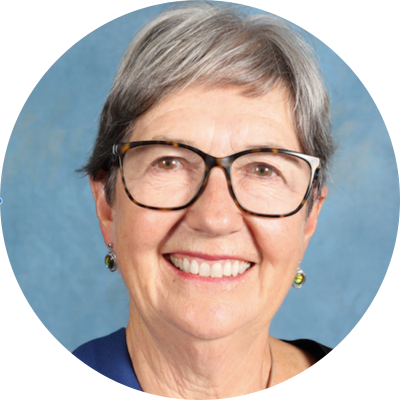
Ann V Sanson
Honorary Professorial Fellow, The University of Melbourne
Ann Sanson’s research career has principally focused on understanding the role of child, family and community characteristics in the social and emotional development and wellbeing of children, adolescents and young adults, particularly through large-scale longitudinal studies. She co-founded several major longitudinal studies in Australia (e.g. (https://www.melbournechildrens.com/atp/; https://growingupinaustralia.gov.au) and has been an advisor to national child longitudinal studies in several other countries.
Over the last decade, her work has focused on seeking to understand the impacts of climate change on children and young people, how they are responding to awareness of the threat it poses to their future lives, and how they can best be supported to thrive and cope effectively with the crisis – and the roles of psychologists and other health professionals in addressing this existential threat.
Ann has over 200 publications, and is a Fellow of the Australian Psychological Society and the International Society for the Study of Behavioural Development. She is Co-founder and Co-chair of Developmental Scientists for Climate Action (https://www.devsca.org/) which aims to support researchers, educators, and practitioners concerned with the impacts of climate change on human development.
